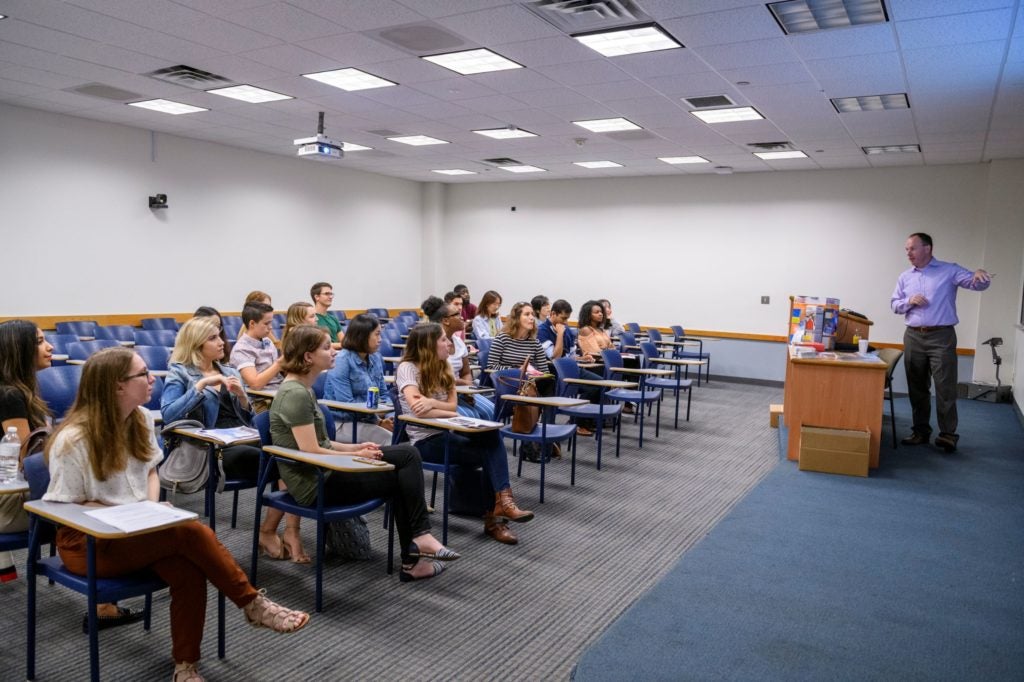PhD in Global Infectious Disease Program
PhD in Global Infectious Disease (GLID) candidates will receive a unique combination of training that brings together science, health, technology, modeling, social sciences, economics and governance. While Global Infectious Disease PhD candidates will specialize in particular areas, they will also learn about the multitude of ways to approach different aspects of infection prevention and control, including life science research, one health, mathematical modeling of outbreaks, economic impacts of pandemics, and diplomacy to advance health outcomes.
Applications for the Fall 2026 Admissions Cycle are now OPEN!

Who should apply to the PhD in Global Infectious Disease?
Individuals dedicated to finding solutions to how the world can better approach infectious diseases are perfect candidates. We are looking for students committed to understanding global infectious disease problems and to approaching them in an interdisciplinary fashion. Students will have an interest in topics ranging from global health security governance, to health delivery economics, to epidemiology, and mathematical modeling. PhD candidates will become an expert in their research area of interest while gaining broad knowledge that can be applied to global infectious disease problems.
This PhD Doctoral program in Global Infectious Disease will prepare successful students to join a growing workforce and find employment in a variety of areas depending on their specialty. These may include federal, state or local health departments, multilateral organizations, advocacy organizations, global health implementers, pharmaceutical companies, and academia, among others.
Admissions Requirements
Curriculum
Doctoral Program students will spend their first year taking core courses that will immerse them in the Global Infectious Disease curriculum. In general, PhD students will take the following Global Infectious Disease core courses in Year 1:
| GLOH 5000: Interdisciplinary Perspectives in Infectious Disease I | Fall I | 3 |
| GLID 5011: Research Methods & Ethics | Fall I | 2 |
| Infection & Immunity Requirement – Multiple Course Options | Fall I | 3 |
| GLOH 5503: Epidemiology Methods | Fall I | 2 |
| GLID 5020: Evidence for Infectious Disease Policy | Fall I or Fall II | 3 |
| GLID 6020: Policy Analysis for GLID OR GLID 5522: Modeling Populations & Diseases | Fall I or Spring I | 1 |
In addition, most students will take either GLID 6020: Policy Analysis for OR GLID 5522: Modeling Populations & Diseases. PhD students will choose additional courses toward the 30-credit requirement based on discussions with their advisor. Some courses may be waived depending on the student’s background.
Students will have the option of doing research rotations with potential mentors during the first 8 months of the program. These rotations would start in September of the first year, but are not required. Students not electing to rotate can begin dissertation research in Year 1.
Students can take electives to provide more specific background related to dissertation research. The remainder of the 30-credit requirement will be determined in partnership with the candidate’s Advisory Committee and Thesis Adviser, based on the candidate’s background and research interests. Most of Year 2 is spent performing research and developing a base of knowledge to write and defend the dissertation proposal, aka the comprehensive exam taken in year 3.
Candidates will sit for a Qualifying Exam at the end of Year 1. Candidates will take their Comprehensive Exam by December of Year 3; this is a written dissertation proposal with oral presentation and defense to ensure research plan is sound and to assess the proposal for the level of effort and timeline proposed.
We anticipate students being able to complete the PhD program in 5 years.

Teaching Requirement
Teaching will be a requirement of the Global Infectious Disease PhD program, to reflect this core skill. There are several different options to complete this requirement, including:
- Serving as a teaching assistant for one semester.
- For senior PhD candidates, teaching an undergraduate class.
- Designing and teaching a short course. For example: designing and teaching a module of the Global Infectious Disease Core Course.
Graduate Certificate In Global Health Diplomacy (H-DIP)
Please note: Certificates are open only to students currently enrolled in
Georgetown University’s accredited degree programs.
Faculty Director: Dr. Rebecca Katz, Director of the Georgetown Center for Global Health Science and Security
The Georgetown University Institute for the Study of Diplomacy, in conjunction with the School of Foreign Service Science, Technology and International Affairs Program, offers a Graduate Certificate in Global Health Diplomacy, designed to prepare students to work in a variety of environments, engaging in multilateral, bilateral, formal and informal efforts to advance health and foreign policy. The certificate will work with students to fill gaps in knowledge and provide the training necessary to operate effectively in the health diplomacy space.
The certificate’s requirements seek to help students integrate and complement their graduate degree programs, to provide them with the skills to assess the complexity of issues and actors in global health diplomacy, to synthesize a wide range of information sources, to extrapolate from relevant case studies and broad strategic goals, and to devise innovative, yet pragmatic policy implementation steps.
The program of study is tailored to the student’s academic focus and career goals, while covering a range of skills-based and topical coursework. Requirements include three core courses, a capstone course, an internship, up to two relevant courses within their program and one elective outside of their graduate program. Students in the Global Infectious Disease program may find that many of the courses they are taking as part of the masters or doctoral program will also count for the certificate.
Application
The application for the graduate certificate is through a google form, due February 1, although interested students should meet with Dr. Katz and academic advisors prior to the application deadline in order to plan their course of study. For more information, including a link to the application site, see the Institute for the Study of Diplomacy certificate site.
Internships
Internships are encouraged for Infectious Disease PhD candidates without work experience, but are not a requirement of the program. Internships can be conducted for credit (up to 3 credits maximum), equivalent to at least 150 hours, with a written summary of the work.
Financial Support
Candidates admitted to the program are offered five years of financial support covering tuition, stipend, and health insurance.
Ph.D Student Handbook for the GLID Program
A copy of the Ph.D. Handbook will be shared with each incoming cohort.
Post-Graduation Outlook
The Global Infectious Disease curriculum is ideal for intellectually curious individuals dedicated to interdisciplinary approaches to global infectious disease problems. It offers both fundamental and advanced teaching on topics that include microbiology, epidemiology, data science, and domestic and global policy and governance. It can prepare you to join a growing workforce and find employment in federal, state or local health departments, emergency management departments, pharmaceutical companies, advocacy organizations, or global health implementers. Some students may wish to pursue an internship during their course of study. Georgetown faculty can help connect students with contacts at organizations such as the Biomedical Advanced Research and Development Agency at the Department of Health and Human Services, the Biotechnology Innovation Organization, Talus Analytics, New York City Health and Hospitals Special Pathogens Unit, USAID Emerging Pandemic Threats program, and the National Academies of Science.
Georgetown University offers its students an array of options related to infectious disease, health security, and global health career paths. Learn more about many of Georgetown’s global health-related degree programs on the Global Health Initiative web page.
